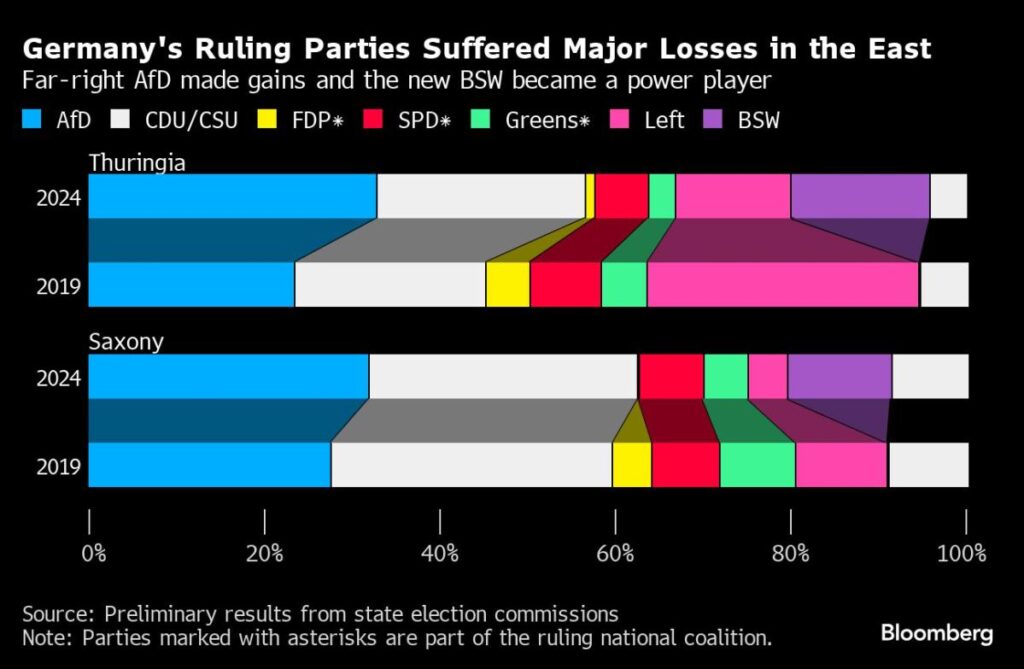(Bloomberg) — A populist surge in elections in two eastern German states on Sunday signaled growing opposition to policies aimed at cleaning up Europe’s largest economy.
Most read from Bloomberg
The Greens, the main driver of Germany’s environmental movement in Chancellor Olaf Scholz’s governing coalition, suffered losses in Saxony and an even bigger blow in Thuringia. In the state won by the climate-skeptic Alternative für Deutschland, the Greens were thrown out of the legislature and 86 percent of voters in a poll by Infratest dimap for public broadcaster ARD said they were dissatisfied.
More bad news could come in three weeks, when Brandenburg — the state surrounding Berlin — votes for a new regional government. The latest poll shows support for the Greens at 5%, the threshold generally needed to secure seats in the legislature.
“The results worry me,” Ingert Liebing, head of the Association of Public Local Utilities (VKU), said at a news conference ahead of the group’s annual congress this week. “Our communities now have little support to continue their transformation.”
Germany aims to cut carbon emissions by two-thirds from 1990 levels by 2030 and reach net zero by 2045, five years ahead of the European Union. While Germany’s stagnant economy needs investment, rising energy costs, the fallout from inflation and government budget battles have raised questions about climate policy.
The government’s willingness to act “will not increase, but will instead be paralyzed by the shock,” said Belit Onay, the mayor of Hanover and a member of the Greens. “That is dramatic.”
As Germany faces major changes, voters have little interest in more climate regulation. Campaigns in both former communist states were dominated by migration, social issues and arms exports to Ukraine — only 4% to 7% of voters said climate protection was their primary concern, according to Infratest dimap.
The AfD — which claimed the first victory for a far-right party in a German state election since World War II in Thuringia — questions whether climate change is man-made and has called for an end to the EU Green Deal and Germany’s withdrawal from the Paris Climate Agreement, even more radical than France’s National Rally.
The party’s state branches also strongly oppose further expansion of wind energy, calling instead for a revival of imports of Russian natural gas.
The newly formed far-left BSW party — which came third in both state elections — said it wanted to leave the decision to build wind farms to local communities, undoing many of the central government’s recent efforts to accelerate the rollout of renewables.
“Expansion targets may be questionable in certain areas,” said Wolfgang Pielmaier of MoveOn Energy, which recently set up the country’s largest solar park in Saxony. Still, he hopes decision-makers will continue to support the expansion of renewables, partly because other parties have ruled out working with the AfD.
The Greens admitted defeat and said the party had not done enough to take into account the impact of their policies on citizens’ wallets.
“It is clear that climate protection must be achieved while taking into account the impact on society,” co-leader Ricarda Lang said in an interview with public broadcaster Phoenix on Monday. “We must recognize that not everyone has the same opportunities.”
–With assistance from Iain Rogers.
Most read from Bloomberg Businessweek
©2024 Bloomberg LP

